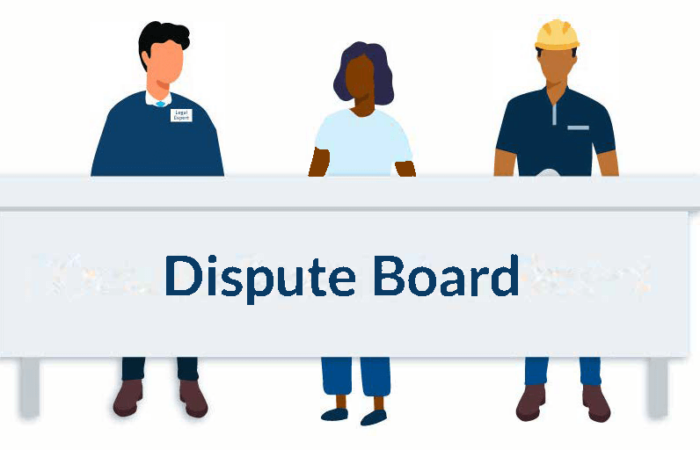
Court of Appeal Clarifies Enforcement of Dispute Board Decision Under Fidic Contract ‘Pink Book’ and Affirms the Principle of Pay Now Argue Later;
The Court of Appeal of Kenya delivered a decision in National Irrigation Board (Formerly National Irrigation Board) v Sogea Satom SA CA E933 of 2023 where the dispute involved the enforcement of decisions of the Dispute Board established under The Fidic Contract, Pink Book.
Parties to the dispute had entered a contract based on FIDIC Pink Book with Clause 20.2 providing any dispute arising out of the contract is to be referred to a Dispute Board (DB). The clause provided in part;
- A decision of the DB shall be Binding on both parties, who shall promptly give effect to it unless and until it shall be revised in an amicable settlement or arbitral award.
- If either party is dissatisfied with a decision of the DB, either party may, within 28 days after receiving the decision, issue a notice of dissatisfaction indicating its dissatisfaction and intention to commence arbitration. No party shall be entitled to commence arbitration of a dispute unless a notice of dissatisfaction is issued in accordance with sub-clause 20.4 of the General Conditions;
- Where no notice of dissatisfaction is given in compliance with sub-clause 20.4 of the General Conditions, the DB’s decision shall be Final and Binding on the parties.
Where a party dissatisfied with the decision of the DB issue a notice of dissatisfaction, the decision of the DB would be binding but not final. Where no notice of dissatisfaction was filed, the decision of DB became final and binding. Whether the decision was final or final and binding, parties were contractually obligated to promptly give effect to it unless the decision is revised through amicable settlement or through Arbitral award.
Four decisions were rendered by DB against the Appellant (NIB) and in favour of Sogea. All the decisions directed NIB to pay some money to Sogea. NIB issued a notice of dissatisfaction and intention to commence Arbitration against two of the decisions only. NIB neither commenced arbitration nor complied with the decisions.
Due non-compliance, Sogea filed a case in High Court seeking enforcement of the decisions. NIB filed an application for stay of the case and referral of the dispute to arbitration in accordance with the contract. The application was filed under section 6(1) of the Arbitration Act. The court dismissed this application on two main grounds. Firstly, the application for stay and referral to arbitration was filed way later after acknowledgment of the claim. Secondly, that there was no dispute and no triable issue would arise in view of the binding nature of the DB decisions and the contractual requirement to pay now argue later. For a referral to be ordered under section 6, there should in fact exist a dispute between the parties with regard to the matters agreed to be referred to arbitration.
The trial court relying on its decision in SBI International Holdings (Kenya) v Kenya National Highway Authority [2020] KEHC 10065 (KLR held that since the right to enforce the DB decision had accrued and must be given effect promptly, it meant there was no dispute to be referred to arbitration in view of clear and unequivocal obligation, “to pay now argue later”.
In the meantime Sogea had filed a motion for summary judgment based on the decision of the DB some which were binding and others which were binding and final. The court found the motion merited and allowed it noting there was no dispute capable of referral to Arbitration and no issues for trial were demonstrated through the affidavit.
On appeal, the court affirmed the position that a party intending to make an application under section 6 of the Arbitration to have the court case stayed and the dispute referred to arbitration, must do so at the time it signifies to the court that it is aware of the claim and not later.
On the question of whether there was any dispute capable of being referred to arbitration, the Court of Appeal has affirmed that where DB makes a decision both parties must promptly comply. Where the is lack of prompt compliance, there is a dispute regarding lack of prompt compliance which is a dispute capable of referral to arbitration.
Whereas the High Court had found that there was no dispute capable of referral to arbitration based on clear and unequivocal obligation, “to pay now argue later, the Court of Appeal disagreed and found the issue is failure to promptly comply is a dispute capable of referral to arbitration.
The finding by the Court of Appeal that there was dispute capable of referral to arbitration is not a progressive one. It will increase the costs of dispute resolution even where DB decision is binding and final. In the instances where DB decision has become final and binding, the successful party should be allowed to skip arbitration and seek summary judgment in court. However, noting the finding of the Court of Appeal, such disputes will have to be referred to arbitration.